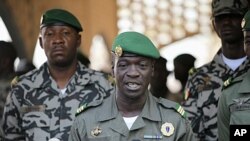Tuareg rebels in northern Mali who seized three towns in a fast-moving offensive have declared an end to military operations.
Mali's recent political developments:
- 2002: Amadou Toumani Toure elected president; re-elected '07.
- 2007-2009: Tuareg fighters battle for autonomy; rebellion ended by '09 agreement.
- January 2012: Well-armed ethnic Tuareg fighters, recently returned from Libya, begin renewed rebellion in north.
- February 2012: Soldiers' families protest against Toure's handling of rebellion.
- March 21: Soldiers launch mutiny outside capital, Bamako; later storm state TV station, presidential palace.
- March 22: Soldiers declare coup on state TV, suspend constitution; president goes into hiding; France, US, UN, AU demand return to civilian rule.
- March 24: Tuaregs renew offensive against towns, Malian army bases.
- March 30-April 1: Rebels seize northern towns of Kidal, Gao, Timbuktu; Junta leader Amadou Sanogo says Mali needs help to fight rebels.
- April 1: Junta declares constitution restored, promises elections, but holds on to power.
- April 2: Economic Community of West African States imposes financial, diplomatic sanctions on Mali, coup leaders; AU starts sanctions next day.
The separatist National Movement for the Liberation of Azawad (MNLA), declared a cease-fire on Thursday, saying it had accomplished its goal.
The Tuareg rebels, along with Islamist fighters, seized the cities of Kidal, Gao and Timbuktu over a three-day period beginning last Friday.
It is unclear if the Islamist militant group Ansar Dine, which fought alongside the rebels, will also put down their weapons. The group, which has been linked to the al-Qaida branch (AQIM) in northern Africa, has imposed Islamic law in some areas.
The Tuareg rebel group wants the northern region to become a separate state that will serve as its homeland.
On Thursday, French Foreign Minister Alain Juppe warned that the Tuareg rebel issue can be solved only through dialogue and not through military action.
Meanwhile, pressure continues to mount against renegade Malian soldiers who seized power from President Amadou Toumani Toure on March 22.
The country's main political parties have rejected a call by military junta leaders for a "national convention" to sort out the country's political and security problems.
The FDR coalition of 50 political and civil society groups said Wednesday that such a convention would not be compatible with a return to constitutional order.
Junta leader Captain Amadou Sanogo had said the proposed meeting of political and civil society representatives could forge a consensus on how to deal with Mali's challenges.
The heavily armed Tuareg rebels arrived in northern Mali after the fall of Moammar Gadhafi in Libya, and launched an insurgency in mid-January. Tuareg separatists have been seeking autonomy for decades.
Some information for this report was provided by Reuters.




